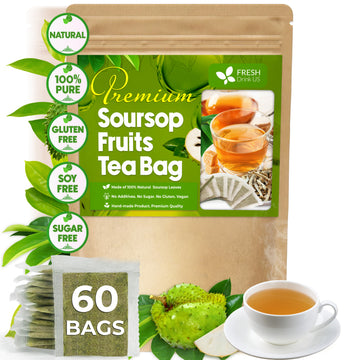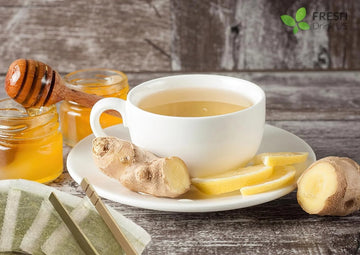Introduction
Ginger has been used for centuries as a remedy for various ailments and as a flavorful addition to food. It belongs to the Zingiberaceae family and is native to Asia. Ginger tea is one popular way to consume ginger, and it offers several health benefits. In this article, we will explore the potential benefits of ginger tea, any potential downsides, and provide a recipe for making it at home.
What is Ginger Tea?
Ginger is a widely used ingredient in cooking and traditional medicine. It can be consumed fresh, pickled, powdered, dried, candied, preserved, or crystalized. Ginger tea is made by boiling the peeled root in water or milk. The main bioactive components of ginger are gingerols and shogaols, which contribute to its health benefits.
Potential Health Benefits
- Motion Sickness Relief: Ginger tea may help reduce symptoms of motion sickness, such as dizziness, vomiting, and cold sweats. Some research suggests that the compounds in ginger block a brain receptor responsible for triggering vomiting.
- Alleviating Nausea: Ginger tea has been traditionally used to relieve nausea caused by pregnancy, chemotherapy, or surgery. It may be an effective alternative to anti-nausea drugs, particularly for pregnant women or chemotherapy patients.
- Supporting Heart Health: Consuming ginger in daily doses may help protect against heart disease by lowering blood pressure, preventing heart attacks, blood clots, and improving blood circulation.
- Managing Weight and Blood Sugar Levels: Ginger may have beneficial effects on weight management by increasing thermogenesis, promoting fat breakdown, inhibiting fat storage and absorption, and controlling appetite. It can also improve blood sugar control in people with type 2 diabetes and obesity.
- Relieving Pain and Inflammation: Ginger has anti-inflammatory properties and can help reduce pain, particularly in conditions like osteoarthritis of the knee and menstrual cramps. It may be as effective as over-the-counter pain relief medications.
- Cancer Prevention: Preliminary studies suggest that ginger may help prevent various types of cancer by causing cell death and inhibiting cancer cell growth. However, more research is needed to fully understand its effects.
- Brain Protection: Ginger’s compounds, gingerol and shogaol, possess antioxidant properties that may protect against brain degenerative diseases like Alzheimer’s by reducing oxidative stress and inflammation.

Potential Downsides
Drinking ginger tea is generally safe and unlikely to cause serious side effects. However, some people may experience gas, bloating, nausea, heartburn, or reflux. It is recommended to consume no more than 4 grams of ginger daily. If you have any concerns or experience adverse effects, consult a healthcare professional. People on blood thinners or blood pressure medications should also exercise caution due to ginger’s potential blood-thinning effect.
How to Make Ginger Tea
To make ginger tea at home, follow this simple recipe:
Ingredients:
- 4–6 thin slices of peeled, raw ginger
- 2 cups of water
- Juice from half a lime or lemon
- Honey or another sweetener (optional)
Directions:
- Wash, peel, and thinly slice the ginger root.
- Fill a medium pot with 2 cups of water and add ginger slices.
- Bring the water to a boil and simmer for 10–20 minutes for milder tea or longer for spicier tea.
- Remove from heat and add lime or lemon juice and honey to taste.
- Serve in your favorite mug.
Frequently Asked Questions
- Is it safe to drink ginger tea every day? Yes, ginger is considered safe, and you can consume up to 4 grams daily.
- Is it okay to drink ginger tea before bed? Yes, ginger tea is caffeine-free and can be enjoyed before bedtime.
- What is the best time to drink ginger tea? You can drink ginger tea at any time of day.
- What does ginger do to the body? Ginger has numerous health benefits, including its potential antioxidant, anti-inflammatory, anti-cancer, and heart- and brain-protective effects.
Conclusion
Ginger tea offers a variety of potential health benefits and is easy to prepare at home. It can help with motion sickness, nausea, heart health, weight management, pain relief, cancer prevention, and brain protection. Drinking ginger tea is generally safe, but it’s important to consult a healthcare professional if you have any concerns or experience adverse effects. So, sit back, relax, and enjoy a cup of soothing ginger tea for good health.













